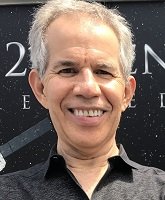Humberto Campins is Pegasus Professor of Physics and Astronomy and head of the Planetary Science group at the University of Central Florida in Orlando. He received a bachelor’s degree from the University of Kansas and a PhD from the University of Arizona. He studies asteroids, comets, and other solar system bodies using a variety of spacecraft, airborne and ground based telescopes. He is a member of the Science Team of NASA’s OSIRIS-REx asteroid sample return mission, which is on its way back to Earth and arriving in 2023. He also works on European Space Agency projects, including the Gaia mission. He directed NASA's Florida Space Grant Consortium for 3 years. He uses observatories around the world, including in Arizona, Chile, France, Hawaii, Spain and Vatican City. In 2010, he discovered water ice and organic molecules on asteroid 24 Themis, adding weight to the idea that some of Earth's water came from asteroids. He has earned multiple teaching and research awards, including a Fulbright Senior Research Award in 2008 to work in Spain, and in 2010 a Don Quijote Award for professional of the year in Orlando. Asteroid "3327 Campins" was named after him by the International Astronomical Union. He established the "Planetary Ambassador Corps," which was a NASA-funded partnership between the University of Central Florida and the Orlando Science Center. As a graduate student, he served as a representative to the Committee for Peaceful Uses of Outer Space of the General Assembly of the United Nations.
Department of State Profile
Bureau of Educational and Cultural Affairs (ECA)
Office of American Spaces (A/M)
Dr. Humberto Campins serves as a Program Analyst in the Bureau of Educational and Cultural Affairs, Office of American Spaces at the U.S. Department of State. The Bureau of Educational and Cultural Affairs fosters mutual understanding between the people of the United States and the people of other countries around the world. The Office of American Spaces develops and supports modern, advanced physical platforms and public diplomacy engagement with foreign audiences.
|




